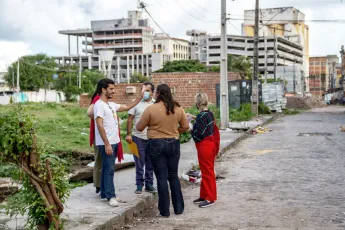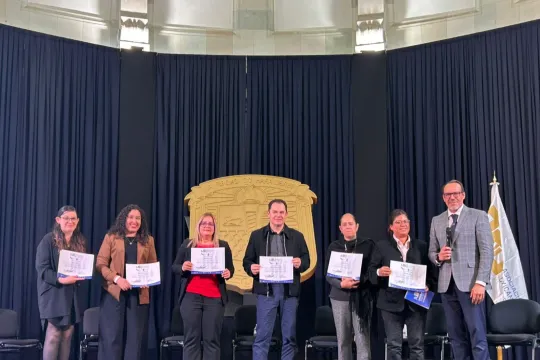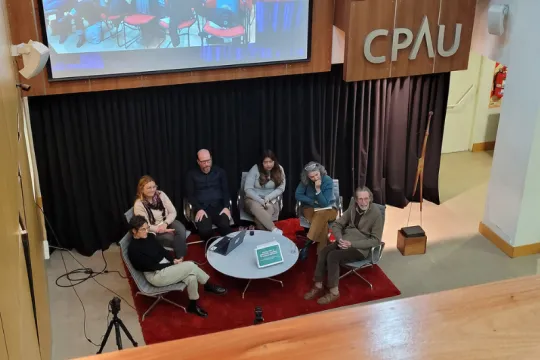
Urban Lab participants walk through the Pilar community in Recife. © Adriana Preta / WRI Brasil
More than 80% of Latin America’s population lives in cities, making it one of the most urbanized areas in the world. The Transformative Urban Coalitions project aims to better understand the challenges this area faces and what solutions exist.
Cities are full of contradictions: they can be beautiful, complex, unequal, vibrant, unsafe, green and polluted at the same time. While these contradictions coexist, people also experience the city differently, perceiving both its potential and its problems according to social factors, such as class, gender and race, as well as their beliefs and values.
More than 80% of Latin America’s population lives in cities, making it one of the most urbanized regions in the world. Such urbanization brings challenges and injustices, such as a shortage of affordable housing, poor waste management, air and water pollution, inequality and insecurity. In the face of these challenges, climate change may seem to have low priority. However, disasters associated with climate change have exacerbated several problems in our cities.
To better understand these challenges – as part of the Transformative Urban Coalitions (TUC) project, coordinated by the United Nations University-Institute of Environment and Human Security and the World Resources Institute – profiles of five cities in Argentina (Buenos Aires), Brazil (Teresina and Recife) and Mexico (León and Naucalpan) have been published. Metropoles with different contexts and cultures, but with an active population that has the same dream: a fairer and more sustainable city.
When analysing these cities through the lenses of political economy and political ecology, we can see that the challenges they face are interconnected and disproportionately affect certain social groups. It is not uncommon for disadvantaged communities, mostly black or indigenous, to face a lack of economic opportunity, poor urban infrastructure and long commutes to access key services. The good news is that if we can understand these connections, we can unleash the power of cities to deliver integrated solutions that simultaneously address climate change, biodiversity loss, the energy crisis, health issues and inequalities.
All this may sound far away to most people. However, Flávia Maia, a climate activist and a descendant of climate migrants from Brazil, warns: “For frontline communities, including those in Teresina (Brazil), climate change is not an abstract phenomenon, it is affecting them now and climate injustice is evident.”
Experts such as Mexican researcher Marisol Romero affirm that effective strategies to generate a better understanding must resonate at a personal level: “It is essential to build common visions through languages that appeal not only to technical knowledge, but also to the diverse experiences of thinking, living and moving through the city.”
New constructs to rethink urban development
The TUC project uses science and art to create languages, methodologies and tools to unlock and empower the creative capacity of cities and their inhabitants to achieve transformation towards sustainability. New constructs are needed, in Latin America and around the world, in which development is redefined. We need to collectively change our perception of what urban growth entails, moving away from ideals of eternal economic growth or technocratic mindsets to incorporate prosperity and well-being as key components of climate action.
“Taking climate action can be a trigger to address urgent urban problems that transcend social polarization and respond to common demands such as access to basic services, efficient mobility and the right to a healthy environment” says Marisol Romero.
This could be facilitated by incorporating climate goals into urban improvement plans and projects and by turning climate mitigation and adaptation projects into local development initiatives. However, TUC research suggests that mainstreaming the climate agenda in Latin American cities is hampered by several factors. These include gaps in municipal climate change data, knowledge and capacities, short-term city administrations, fragmented policy agendas and insufficient funding.
Where to focus the attention?
In some cities, for example in Naucalpan (Mexico) and Teresina (Brazil), urban climate governance is still under development, which represents a key opportunity to promote coordination between different government agencies and levels; to increase technical knowledge in municipal government and awareness at the community level; to foster the generation and dissemination of climate data; to strengthen citizen participation especially of vulnerable groups; and to leverage public and private funds in accordance with climate action.
In cities with more established urban climate governance, such as Buenos Aires (Argentina), León (Mexico) and Recife (Brazil), the focus should be on linking strategic planning and implementation at the neighborhood level.
Amplified capacity-building in the form of transformative climate initiatives driven by local communities will lead to more socially just and sustainable development trajectories that respond to the climate emergency. As part of the process, financial flows should be restructured.
Latin America has a rich background of social movements and local organizations fighting climate change while addressing issues of inequality. Recognizing the contributions of existing and emerging practices and embracing the capacity of actors outside of government creates opportunities to collaboratively think, build and manage cities in more sustainable, resilient and just ways.
This article was originally published in El País. See original article in Spanish.

